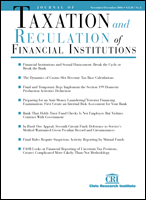The Growing Impact of the Sarbanes-Oxley Act of 2002 on Private Companies
Author: Michael J.W. Rennock.; Elizabeth C. Duffy.
Source: Volume 18, Number 02, November/December 2004 , pp.18-24(7)

< previous article |next article > |return to table of contents
Abstract:
Although the Sarbanes-Oxley Act of 2002 (the “Act”)1 was adopted to respond to real and perceived problems relating to the corporate governance of public companies, its sphere of influence also extends, directly and indirectly, to private companies. Certain provisions of the Act apply directly to public and private companies alike. Interestingly, a private company may become subject to the corporate governance provisions of the Act indirectly in a variety of contexts, including: preparation for an initial public offering (IPO); a merger with, or an acquisition by, a public company already subject to the Act; the registration of debt by a private company; requirements imposed by lenders or investors; requirements imposed by insurance companies, particularly in connection with obtaining directors’ and officers’ insurance; requirements imposed by contracts with governmental entities; requirements imposed by new directors in connection with agreeing to serve on the board; and the enactment of state law analogs to the Act. To the extent that the governance and financial and internal reporting provisions of the Act establish “best practices” for companies, a private company may find it advisable to voluntarily comply with the requirements of the Act. Despite the associated costs, including the distraction of management from the operation and growth of the company’s business, voluntary compliance with the Act may benefit a private company. Benefits may include improving the quality of financial and internal reporting and thereby reducing fraud, improving the exercise of fiduciary duties by directors and officers, creating defenses against derivative lawsuits, and increasing the attractiveness and possibly the valuation of the private company to lenders, investors and acquirors. This article will examine the aspects of the Act that directly and indirectly impact private companies. It will focus on the indirect impact of the Act under two scenarios: first, the IPO process and the additional considerations a private company must address in preparing to go public; and second, the merger with or acquisition of a private company by a public company, as well as the correlative steps undertaken by a private company in preparation for acquisition by a public company. Finally, this article will recommend provisions of the Act that private companies may find advisable to adopt.Keywords:
Affiliations:
1: Morrison & Foerster LLP; 2: Morrison & Foerster LLP.